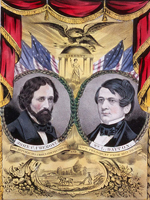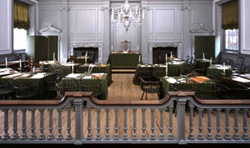1. "Our Constitution is so simple and practical that it is possible always to meet extraordinary needs by changes in emphasis and arrangement without loss of essential form."
Herbert Hoover
Franklin D. Roosevelt
Woodrow Wilson
Abraham Lincoln
 Roosevelt spoke these words on March 4, 1933, in his First Inaugural Address— which also included his famous phrase "the only thing we have to fear is fear itself." In this speech, FDR first assured the American people that he had faith that the Constitution and current understandings of constitutionally-acceptable presidential power were sufficient to overcome the crisis posed by the Great Depression. He then went on to note that, if necessary for the good of the country, he would ask Congress for executive power equivalent to that granted in wartime.
Roosevelt spoke these words on March 4, 1933, in his First Inaugural Address— which also included his famous phrase "the only thing we have to fear is fear itself." In this speech, FDR first assured the American people that he had faith that the Constitution and current understandings of constitutionally-acceptable presidential power were sufficient to overcome the crisis posed by the Great Depression. He then went on to note that, if necessary for the good of the country, he would ask Congress for executive power equivalent to that granted in wartime.
During his presidency, many of FDR's New Deal reforms would be found unconstitutional by the U.S. Supreme Court, leading to constant tension and conflict between the President and the court.
2. "In examining the Constitution of the United States, which is the most perfect federal constitution that ever existed, one is startled, on the other hand, at the variety of information and the excellence of discretion which it presupposes in the people whom it is meant to govern."
Pierre-Etienne Du Ponceau
Benjamin Franklin
Alexis de Tocqueville
Marquis de Lafayette
 In his book Democracy in America, French thinker, writer, and politician Alexis de Tocqueville (1805-1859), considers the strengths and weakness of the American federal system of government as it was in the early 1830s, when he visited the young country on a 9-month tour. This passage comes from chapter 8 of the book's first volume: "On the Federal Constitution." Subheading "The Federal Constitution, Part V," "Why the Federal System is Not Adapted to All Peoples" looks at the uniqueness of the Constitution and of the expectations it sets out for the people putting it into practice.
In his book Democracy in America, French thinker, writer, and politician Alexis de Tocqueville (1805-1859), considers the strengths and weakness of the American federal system of government as it was in the early 1830s, when he visited the young country on a 9-month tour. This passage comes from chapter 8 of the book's first volume: "On the Federal Constitution." Subheading "The Federal Constitution, Part V," "Why the Federal System is Not Adapted to All Peoples" looks at the uniqueness of the Constitution and of the expectations it sets out for the people putting it into practice.
3. "A sacred compact, forsooth! We pronounce it the most bloody and heaven-daring arrangement ever made by men for the continuance and protection of a system of the most atrocious villainy ever exhibited on earth."
William Lloyd Garrison
Frederick Douglass
John Murray Spear
Lydia Maria Child
 Fiery abolitionist William Lloyd Garrison (1805-1879) included this condemnation of the Constitution in the December 29, 1832, issue of his abolitionist newspaper The Liberator. The article in which it appeared, titled "On the Constitution and the Union," denounced the Constitution for allowing slavery to exist in the U.S., calling it a document "dripping" "with human blood."
Fiery abolitionist William Lloyd Garrison (1805-1879) included this condemnation of the Constitution in the December 29, 1832, issue of his abolitionist newspaper The Liberator. The article in which it appeared, titled "On the Constitution and the Union," denounced the Constitution for allowing slavery to exist in the U.S., calling it a document "dripping" "with human blood."
Garrison famously burned a copy of the Constitution at a 4th of July gathering in Farmingham, MA.
4. "The Constitution was founded on the law of gravitation. The government was to exist and move by virtue of the efficacy of 'checks and balances.' The trouble with the theory is that government is not a machine, but a living thing."
Woodrow Wilson
Franklin D. Roosevelt
Theodore Roosevelt
Lyndon B. Johnson
 Woodrow Wilson included these words in his 1913 book The New Freedom: A Call for the Emancipation of the Generous Energies of a People, which laid out many of the views on which he had campaigned for the presidency. Writing in 1885, in his earlier book Congressional Government, Wilson saw many problems in the United States' established form of government, arguing that the Founders' system of checks and balances obscured responsibility more than it ensured balance. Wilson saw the Constitution as a product of a certain time and place, with questionable relevance to the present day.
Woodrow Wilson included these words in his 1913 book The New Freedom: A Call for the Emancipation of the Generous Energies of a People, which laid out many of the views on which he had campaigned for the presidency. Writing in 1885, in his earlier book Congressional Government, Wilson saw many problems in the United States' established form of government, arguing that the Founders' system of checks and balances obscured responsibility more than it ensured balance. Wilson saw the Constitution as a product of a certain time and place, with questionable relevance to the present day.


 Roosevelt spoke these words on March 4, 1933, in his First Inaugural Address— which also included his famous phrase "the only thing we have to fear is fear itself." In this speech, FDR first assured the American people that he had faith that the Constitution and current understandings of constitutionally-acceptable presidential power were sufficient to overcome the crisis posed by the Great Depression. He then went on to note that, if necessary for the good of the country, he would ask Congress for executive power equivalent to that granted in wartime.
Roosevelt spoke these words on March 4, 1933, in his First Inaugural Address— which also included his famous phrase "the only thing we have to fear is fear itself." In this speech, FDR first assured the American people that he had faith that the Constitution and current understandings of constitutionally-acceptable presidential power were sufficient to overcome the crisis posed by the Great Depression. He then went on to note that, if necessary for the good of the country, he would ask Congress for executive power equivalent to that granted in wartime. In his book Democracy in America, French thinker, writer, and politician Alexis de Tocqueville (1805-1859), considers the strengths and weakness of the American federal system of government as it was in the early 1830s, when he visited the young country on a 9-month tour. This passage comes from chapter 8 of the book's first volume: "On the Federal Constitution." Subheading "The Federal Constitution, Part V," "Why the Federal System is Not Adapted to All Peoples" looks at the uniqueness of the Constitution and of the expectations it sets out for the people putting it into practice.
In his book Democracy in America, French thinker, writer, and politician Alexis de Tocqueville (1805-1859), considers the strengths and weakness of the American federal system of government as it was in the early 1830s, when he visited the young country on a 9-month tour. This passage comes from chapter 8 of the book's first volume: "On the Federal Constitution." Subheading "The Federal Constitution, Part V," "Why the Federal System is Not Adapted to All Peoples" looks at the uniqueness of the Constitution and of the expectations it sets out for the people putting it into practice.  Fiery abolitionist William Lloyd Garrison (1805-1879) included this condemnation of the Constitution in the December 29, 1832, issue of his abolitionist newspaper The Liberator. The article in which it appeared, titled "On the Constitution and the Union," denounced the Constitution for allowing slavery to exist in the U.S., calling it a document "dripping" "with human blood."
Fiery abolitionist William Lloyd Garrison (1805-1879) included this condemnation of the Constitution in the December 29, 1832, issue of his abolitionist newspaper The Liberator. The article in which it appeared, titled "On the Constitution and the Union," denounced the Constitution for allowing slavery to exist in the U.S., calling it a document "dripping" "with human blood."  Woodrow Wilson included these words in his 1913 book The New Freedom: A Call for the Emancipation of the Generous Energies of a People, which laid out many of the views on which he had campaigned for the presidency. Writing in 1885, in his earlier book Congressional Government, Wilson saw many problems in the United States' established form of government, arguing that the Founders' system of checks and balances obscured responsibility more than it ensured balance. Wilson saw the Constitution as a product of a certain time and place, with questionable relevance to the present day.
Woodrow Wilson included these words in his 1913 book The New Freedom: A Call for the Emancipation of the Generous Energies of a People, which laid out many of the views on which he had campaigned for the presidency. Writing in 1885, in his earlier book Congressional Government, Wilson saw many problems in the United States' established form of government, arguing that the Founders' system of checks and balances obscured responsibility more than it ensured balance. Wilson saw the Constitution as a product of a certain time and place, with questionable relevance to the present day. 
